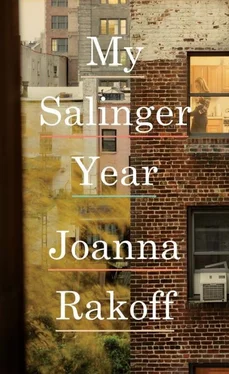He shrugged. “I don’t know. She’s very tight-lipped. I have this idea that she’s from money and that she had a sort of wild youth.” I looked at him. “Why don’t you ask her? She’s really nice.” He smiled wickedly. “And once she has a drink, she really gets going.” It seemed to me that after having a drink, she fell asleep. Though perhaps that was after a few drinks. “You know that’s not always water on her desk.”
“You’re kidding!” I cried. Then I began thinking about the various cups and tumblers on my own boss’s desk. “No!”
He shrugged. “She’s from a different era.”
For the next few weeks, I lingered in Carolyn’s doorway after dropping off the circulating folders and on Fridays, when the staff gathered for scotch in the reception area, made sure to sit near her. But I couldn’t bring myself to talk to her. I knew exactly why: She didn’t see me. I was simply part of the landscape of the office. In the entire year I worked there, she spoke not one word to me. When I deposited the folders on her desk, she merely nodded in my direction. At first, I took this personally. Then I saw it as a quirk of her personality, her genteel reticence. But eventually I realized that I was a position to her, rather than an individual: How many like me had she seen over her decades there? Dozens? We were disposable, interchangeable, in our wool skirts and college ties, our eyes shiny with puppyish excitement about books. She had no use for us. In a year, we’d be gone.
One Saturday in May, I took the bus home for a belated birthday celebration with my parents. After dinner, my dad called me into his study and handed me three short envelopes. “I’m passing these over to you,” he said. “Since you have a job now, it seems like the right time.”
I glanced down at the top envelope. Citibank.
“They’re bills,” my father explained, taking them back from me and scanning the return addresses. He separated two out and held them up for my inspection, like an offering. “These two are from your credit cards.” I must have looked baffled, because he continued. “You have two credit cards, right?” I nodded. Smoothing his white hair, he arranged his face into the mollifying expression he adopted before doling out bad news. I remembered it well from my teen years. “You may recall”—he had taken on the fake British accent he used sometimes at moments of intense discomfort, mastered while playing a butler at an Actors Studio production of some ossified drawing room mystery—“we gave you those two cards when you went to college. The idea was that you would use them for books or”—he threw up his hands—“anything. Plane tickets. Shoes.” I nodded again, though my palms were beginning to sweat. “Well, I’ve been paying the interest while you’ve been in school. But now you’re done, so you can take them over.” I looked at him, too stunned to nod. All through college and grad school, I’d worked two jobs at a time, to pay for incidentals and small luxuries, under the impression that my parents were happy to cover my basic expenses. I had been under this impression because, well, they had told me that this was the case. My mother, in fact, had fought me about working. “You have your whole life to work,” she’d said endlessly. “Just concentrate on school now.”
My father held up the third envelope. “These are your student loans.” The saliva disappeared from my mouth. My father had more to say—low interest rates, consolidation, federal blah blah, Pell Grant—but I couldn’t focus on what he was saying. Student loans? As far as I knew, I’d gone to school on a National Merit Scholarship.
“I don’t remember filling out the paperwork for loans,” I said, my tongue sticking drily to the back of my teeth.
“Oh, I did it for you.” My father waved his hands impatiently. “I forged your signature. I do it all the time.”
“My scholarship…” But my voice trailed off. I didn’t need to ask, I supposed. What did it matter?
“It didn’t cover everything, every year. And we thought it would be good for you to have student loans. It’s good debt and you can deduct the interest from your taxes.” This meant absolutely nothing to me, but I resumed my nodding, aiming for brightness. “And it helps you build good credit. So when you want to buy a house, you’ll be in good shape. Same with the credit cards. You have great credit right now.”
“Great,” I said, forcing myself to smile. With a theatrical flourish, he handed me the envelopes. “When I want to buy a house. Yes.”
“The bills will start coming directly to you next month.”
“Great,” I croaked, then turned on my heel and left the room so he wouldn’t witness my tears. The minute I lay down on my childhood bed they arrived, hot and heavy, and I buried my face in my old pillow, the feathers turned to dust.
Finally, I wiped my eyes and slit open the envelopes. The balance on one credit card was $5,643. The other $6,011. I owed Chase and Citibank $11,000. Almost two-thirds of my salary. How had I spent $11,000 in five years? On what? Books, I knew, and plane tickets home. In London, there had been food, and phone calls—my parents had asked me to call twice a week and instructed me to use the cards for this purpose. There had also been, yes, a few pairs of shoes. A backpack or two. And surely other things I could have lived without. I wished, now, that I could take it all back. I’d not, by any means, frittered away money recklessly, but I’d certainly spent more than I would have if I’d not thought the bills would be magically taken care of. How stupid I’d been.
The student loan bill was far more frightening. It didn’t state how much I owed in total—ominously—but merely indicated I needed to send my payment for May within the next ten days: a payment of $473. Or, almost two weeks’ salary. After rent, I’d have pretty much nothing left. Never mind the immediate problem, which was that I didn’t have $473 to send them and likely wouldn’t obtain such a sum in the next ten days. That I could barely pay for rent and food, as it was.
“Jo?” my mother called from the living room, but I couldn’t bring myself to answer.
Perhaps ten days later, a package from Orchises arrived, the Agency’s name handwritten on the front of the padded mailer. That afternoon, my boss leafed through the materials, over and over, trying, I supposed, to compose her thoughts on the matter. At the end of the day, she handed them back to me. It was cool and rainy, as it had been for a few days, and she didn’t complain when Hugh dashed into her office and closed the windows. “Okay,” she said wearily. “I guess we better get these off to Jerry. I’ll dictate a cover letter. Tomorrow’s fine, though.”
“Okay,” I replied, surprised. She was not a tomorrow’s-fine person. She was a do-it-now person. She wanted, I supposed, the “Hapworth” situation to dissolve into thin air, to simply go away. If we waited until tomorrow to send the books, maybe Salinger would come to his senses. Maybe he’d call and say, “That guy’s a phony. What was I thinking?” This deal would be a huge amount of work, which would net the Agency a minuscule amount of money, if any. But now that we had the press’s books in hand, it was beginning to seem less abstract.
The next morning arrived—cold, rainy again—and I typed the sort of tiny letter that mystified me: Dear Jerry, Enclosed are a few of Orchises Press’s recent releases, as well as a copy of its most current catalog, for your perusal. I look forward to hearing your thoughts . And off they went to Cornish. We would wait again.
While she waited, my boss found it hard to focus on anything else, and I found myself, for the first time since I’d started, without a backlog of typing. I sat at my desk and read manuscripts. I fended off the usual calls for Salinger. I pored over contracts for my boss, as she’d trained me to do, seeking out errant clauses and words: a tedious task but one I loved, for I could lose myself in it, so fully did it require my concentration. And when I was done, when I finally had nothing else to do, I turned to the Salinger letters.
Читать дальше












